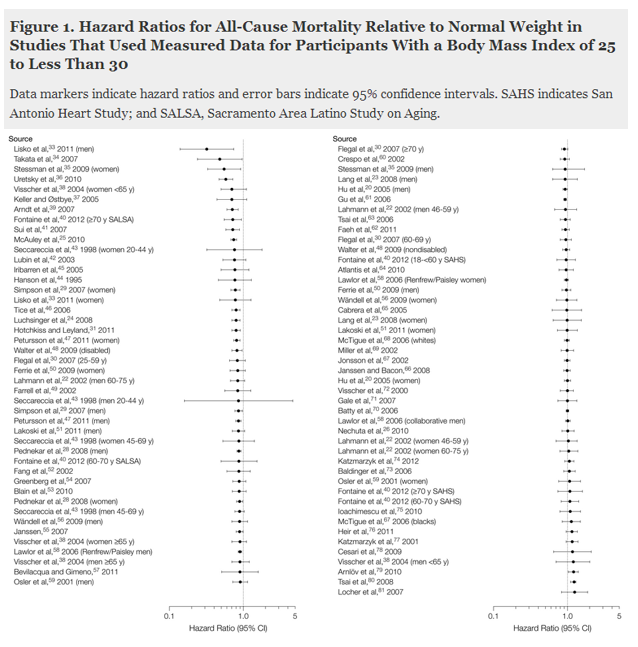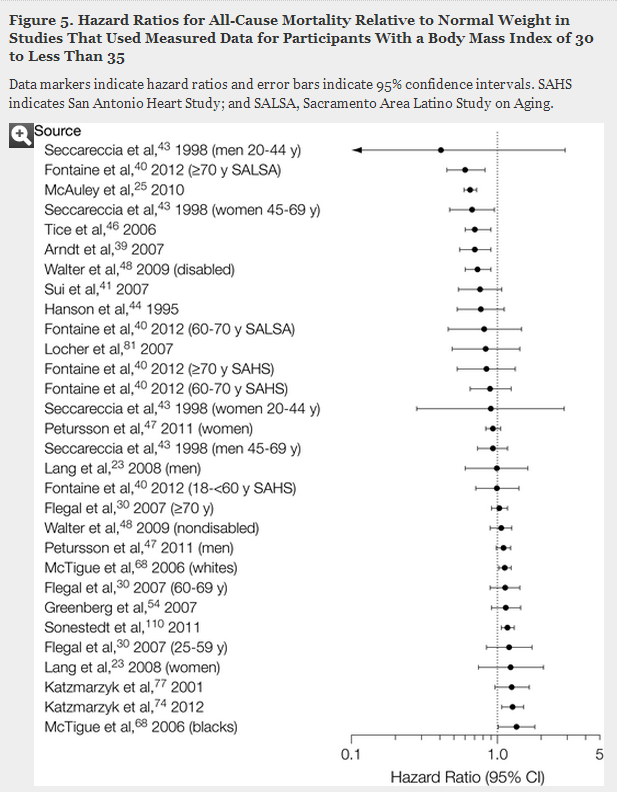Last year the Journal of the American Medical Association released a study aiming to determine the relationship between body mass index and the risk of premature death. Body mass index, or BMI, is the ratio between your height and weight. According to the National Institutes of Health, you are “normal weight” if your ratio is between 18.5-24.9. Everything over that is considered “overweight” or “obese” and everything under is “underweight.”
This study was a meta-analysis, which is an analysis of a collection of existing studies that systematically measures the sum of our knowledge. In this case, the authors analyzed 97 studies that included a combined 2.88 million individuals and over 270,000 deaths. They found that overweight individuals had a lower risk of premature death than so-called normal-weight individuals and there was no relationship between being somewhat overweight and the rate of early death. Only among people in the high range of obesity was there a correlation between their weight and a higher risk of premature death.
Here’s what it looked like.
This is two columns of studies plotted according to the hazard ratio they reported for people. This comparison is between people who are “overweight” (BMI = 25-29.9) and people who are “normal weight” (BMI = 18.5-24.9). Studies that fall below the line marked 1.0 found a lower rate of premature death and studies above the line found a higher rate.

Just by eyeballing it, you can confirm that there is not a strong correlation between weight and premature death, at least in this population. When the scientists ran statistical analyses, the math showed that there is a statistically significant relationship between being “overweight” and a lower risk of death.
Here’s the same data, but comparing the risk of premature death among people who are “normal weight” (BMI = 18.5-24.9) and people who are somewhat “obese” (BMI = 30-34.9). Again, eyeballing the results suggest that there’s not much correlation and, in fact, statistical analysis found none.

Finally, here are the results comparing “normal weight” (BMI = 18.5-24.9) and people who are quite “obese” (BMI = 35 or higher). In this case, we do see a relationship between risk of premature death in body weight.

It’s almost funny that the National Institutes of Health uses the word normal when talking about BMI. It’s certainly not the norm—the average BMI in the U.S. falls slightly into the “overweight” category (26.6 for adult men and 25.5 for adult women)—and it’s not related to health. It’s clearly simply normative. It’s related to a socially constructed physical ideal that has little relationship to what physicians and public health advocates are supposed to be concerned with. Normal is judgmental, but if they change the word to healthy, they have to entirely re-work their prescriptions.
So, do we even have an obesity epidemic? Perhaps not if we use health as a marker instead of some arbitrary decision to hate fat. Paul Campos, covering this story for the New York Timeslast year, points out:
If the government were to redefine normal weight as one that does not increase the risk of death, then about 130 million of the 165 million American adults currently categorized as overweight and obese would be re-categorized as normal weight instead.
That’s 79 percent.
It’s worth saying again: If we are measuring by the risk of premature death, then 79 percent of the people we currently shame for being overweight or obese would be re-categorized as perfectly fine. Ideal, even. Pleased to be plump, let’s say, knowing that a body that is a happy balance of soft and strong is the kind of body that will carry them through a lifetime.
This post originally appeared on Sociological Images, a Pacific Standard partner site, as “Overweight Americans Have the Lowest Risk of Premature Death.”




